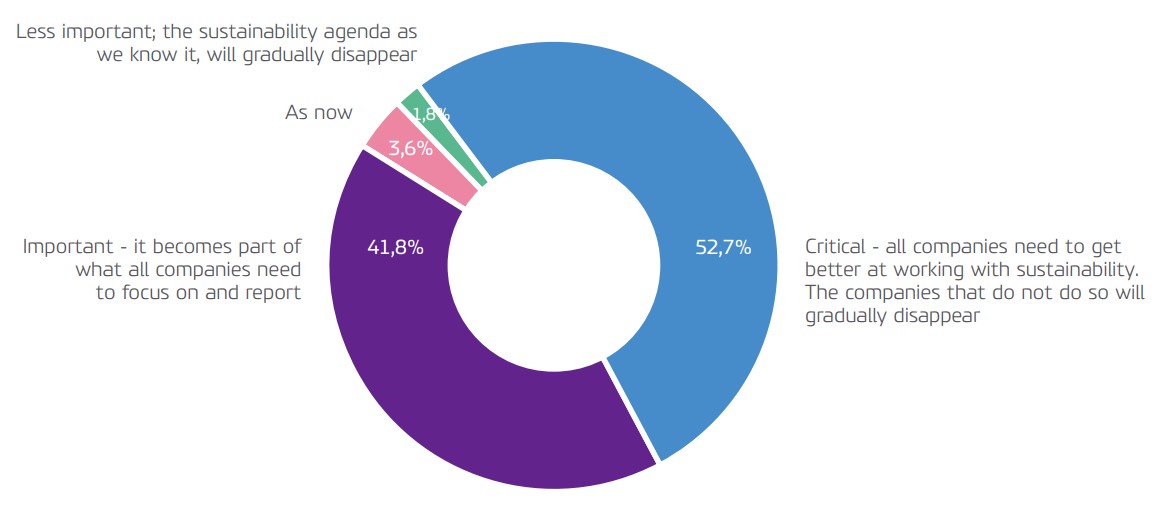As mentioned at the beginning of this report, we believe that technology and
sustainability go hand in hand. Both existing cases and interviews demonstrate that technology can have a profound impact on sustainability activities, especially when it is customized to do so (scrubbers, CO2 sensors, electric vehicles, energy storage, ELD lights, etc). What we have seen, is that sensors, IoT, data and analytics are some of the most commonly applied technologies in sustainability. In particular, we see that these can be applied to understand asset performance, resource consumption and waste levels in a number of industries. We have also observed an increasing interest in using more advanced solutions like algorithms and augmented reality technologies to help organizations understand how to become more sustainable.
In the survey, more than 90% of the respondents said that technology plays a role in helping their sustainability initiatives (Figure 7), and one in three respondents indicated that technology was crucial to their sustainability inititives. Interestingly, they also said that new technology is important because it helps the organizations to create more sustainable products and services and it enables them to focus on the most important areas and to optimize processes. In addition, it facilitates work with external parties on sustainability initiatives. Only one in ten companies indicated that new technology is not important in their
sustainability work.

On the other hand, the study also suggested that although technology is seen as playing an important role in driving sustainability initiatives, it is also difficult to determine the exact effect technology contributes with, or which technology the company should focus on and implement. To complement this, our research has shown that areas such as ERP and Cloudification, are not connected to or used in the area of sustainability, in the same way as data and analytics are.
Our interpretation of this is that, generally, there is still a high level of immaturity in applying technology – especially technology which is not purposely built for sustainability – to drive improved sustainability performance. Furthermore, when ERP is not connected to sustainability it is hard to argue that sustainability is a part of the CFOs KPIs, or agenda.
The Future
During these trying times of the COVID-19 virus, the issue of sustainability is more
important than ever. Previous research and associated articles we have published, show that there are four common factors impacting the virus and sustainability: sustainability work
- increased urbanization
- increased demand for food
- a constant drive for growth and profit
- a destabilization of global politics
These commonalities suggest that the type of resilience and solution, that is required for a business to have the greatest chance of survival during a global pandemic, is in many ways secured by focusing on the SDGs. Therefore, we asked our respondents to tell us how the pandemic have impacted their sustainability activities.

focus on the UN SDGs will be for different organizations in the future?
Although the study shows that there is a broad degree of uncertainty about what happens in the future, more than 90% of the respondents suggested that in the future, sustainability will be even more important and critical than it is today (Figure 8).
Considering that the Coronavirus crisis is far from over, and that the global financial fall out is expected to get worse rather than better, Devoteam’s view is that the organizations that indicate they will continue to work with sustainability need to focus on realizing positive financial impact from this immediately.
As a result, the challenge many organizations need to face is double-sided: businesses and organizations will need sustainability to have a chance to survive in the global environment of tomorrow. However, they have to understand how to operationalize the impact and realize and illustrate the financial value sustainability adds – otherwise the activities will be stopped.
